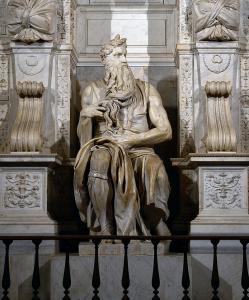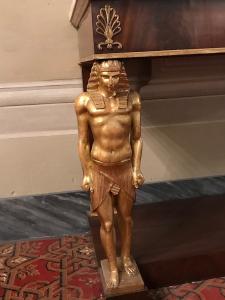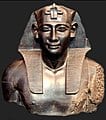 As you can see, I have decided to return to the Revised Common Lectionary as source for at least some of my essays. I am doing this for several reasons: my wife is currently the children and family minister of our church, and this church, as do many, uses the lectionary as the basis for its preaching and its children and youth education; and it has been some time since I have addressed this cycle of texts, a cycle that purports to cover significant portions of the biblical accounts; and I have heard from a few readers that they miss my reflections on the lectionary texts that they use. To be fair, that last group is miniscule indeed, but helped me to make the decision to take on the lectionary once again. This week’s text from Exodus begins a lengthy group of Exodus texts, not concluding until October 18. So, get ready for a closer look at Exodus, the very heart of Israelite theology.
As you can see, I have decided to return to the Revised Common Lectionary as source for at least some of my essays. I am doing this for several reasons: my wife is currently the children and family minister of our church, and this church, as do many, uses the lectionary as the basis for its preaching and its children and youth education; and it has been some time since I have addressed this cycle of texts, a cycle that purports to cover significant portions of the biblical accounts; and I have heard from a few readers that they miss my reflections on the lectionary texts that they use. To be fair, that last group is miniscule indeed, but helped me to make the decision to take on the lectionary once again. This week’s text from Exodus begins a lengthy group of Exodus texts, not concluding until October 18. So, get ready for a closer look at Exodus, the very heart of Israelite theology.
It is important to begin by asking: just what are we reading when we read the complex book of Exodus? There is much storytelling, but also a large swath of legal and cultic material. We will even find some very ancient poetry among its pages. Because all that is true, it is certain that the entire 40-chapter book was not compiled until late in Israel’s literary history, perhaps during the Babylonian exile of Israel in the 6th century BCE, if not even later. Thus, the book covers at least 600 years of writing, from the old Song of the Sea at Ex.15:21 to the details of ark construction (Ex.25, 37) and the correct materials for creating a tabernacle (Ex.26, 38). But surely its heart is the grand tale of the exodus from Egypt and the victory over the forces of pharaoh at the Sea of Reeds. Here is the Israelite resurrection story: on the west bank of the sea, they were slaves, while on the east bank, they became the free people of YHWH. Every year for over two millennia, Jews have consecrated and celebrated this story in the festival of the Passover.
However, there remains a significant problem when approaching the book of Exodus. Since the rise of the critical study of the Bible in the 18th and 19th centuries, primarily historical questions have been raised about the stories, assuming that genuine and lasting truth could only be corroborated by historical facts. When did these events occur? Just which pharaoh is being talked about in Ex.1:8? Where precisely was the Sea of Reeds, the literal translation of the body of water mentioned in Ex.14-15? How many people escaped from Egypt, led by Moses, since two numbers at least are mentioned? I have visited Israel and Egypt several times, and each time one guide or another regaled our groups with supposed historical tales of where and when and how many, as they had been trained to do by teachers trained in historical study of the Bible. I want to suggest as we begin our journey through Exodus that these are not the right questions to ask.
I think there is little if any history to be found in the stories we are about to read, and if we ask questions of history we are bound to find only argumentative disappointment. I suggest that what the tales of Exodus are in fact are fables, celebrated and legendary stories written by oppressed peoples as ways to thumb their noses at their vastly more powerful oppressors. To read them for their history is not only to misread them, but at the same time to run the risk of extracting from them their sharp stings against those at whom they are directed. As we read the stories, we must get over forever that idea that only history is the basis for truth; lest something “happened,” the true power of the events of the exodus cannot be experienced. Nothing could be further from the truth. Just as I do not need to know the location of Elsinore castle in Denmark or the history of that fortification to appreciate and value the magnificent play, “Hamlet,” so I have no need of any precise historical knowledge, beyond the most general, to understand what the writers of the stories of Exodus wished to say to Israel and to Egypt, as representative of an oppressor of Israel. The certainty that the opening gambits of Exodus are in fact fable, perhaps more specifically satiric fable, can readily be seen by looking with care at what is bring presented in today’s text.
The certainty that we are reading an Israelite story about Egypt is made clear in Ex.1:8. “Now a new king arose over Egypt who did not know Joseph.” No one with any acquaintance with the ways Egyptians always designated their leaders would have called that leader a king. The ancient title pharaoh, meaning “great house,” was the only possible name for the god-like ruler of the Black Land. By naming pharaoh as just another king, the Israelite author has begun an assault on the world’s greatest power. Pharaoh may claim to be “son of the sun god, Ra,” but there is but one king in the universe, YHWH, and the tale will proceed to enumerate that singular truth in the story that follows.
In Ex.1:8-22, this “king” of Egypt is portrayed as far less than a son of some god. He is in fact a blithering idiot, imagining that the slaves of Israel are “more numerous and more powerful than we,” a ludicrous evaluation of a gaggle of slaves over against the greatest military might in the world. And instead of simply annihilating these supposed dangerous Israelites, the king devises what he calls a “shrewd” plan, employing the Hebrew word for “wisdom” to describe the clever ploy. His plan consists of working them all nearly to death with the express purpose of stopping them from doing what they do so well, namely “multiplying” and “increasing.” Of course, this is exactly what YHWH told them to do at the world’s creation, and repeated the command at each utterance of the patriarchal/matriarchal promise throughout Genesis. Unfortunately for the king, the plan is a rank failure, because “the more they were oppressed, the more they multiplied and spread, so that the Egyptians came to dread the Israelites” (Ex.1:11-12). There appears to be something almost magical about this group of slaves; harder work does not yield fewer babies, but more. And increased labor has no effect (Ex.1:13-14).
So the king moves to a plan B. Now he invites two Hebrew midwives, charged with aiding Israelite women in their birthing, to attend him in the throne room. There he commands that they murder all male babies at birth, but allow the female children to live. Of course, this is an absurd plan! One ought kill the women; after all they possess that exclusive birthing ability. It only takes one male to keep the process going! In any case, the two midwives, Shiphrah and Puah by name, refuse to follow orders and let all the males live, too. As the Israelite census proves, their increase has not slowed at all, and the king recalls the women to him, demanding them to explain what is going on; just why have you allowed the males to live? Their response is hilarious, fully worthy of the fable we are reading. “Hebrew women are not like Egyptian women,” they say. “They are vigorous (lit. “full of life”) and give birth before we can get to the birth stools!” This of course is a whopper, and any great king would see through the lie immediately, as well as to be offended by the aspersions cast on his Egyptian women, who apparently are not vigorous at all. But not this king! His plan C, in light of the complete failure of plans A and B, is to shout, completely madly, “Every boy that is born shall be thrown into the Nile” (Ex.1:22). The NRSV adds, as many translations do, the words from the Greek translation of the passage: “every boy born to the Hebrews,” but the Hebrew text does not say that—it says every male shall be tossed into the Nile. The Greek is more rational, but the point in the fable is that the king of Egypt is not rational; he thus consigns every male, including his own Egyptian males, to a watery grave. Of course, we all know that one male Israelite will indeed be found in the Nile, but not to die, but to live and become the savior of his people.
That story continues our fable (Ex.2:1-10). Moses is born, and is a healthy baby, and is hidden by his mother who knows that all male children are to be killed. In desperation she makes a little ark (it is the same word from Genesis’s ark of Noah, the only two places the word is used in the Hebrew Bible), and places Moses in it. Fable-like, the ark floats right into the palace of pharaoh, where his own daughter rescues the baby, saves it from the cruel edict of her father, pays the baby’s own mother to nurse her child (!), and nurtures the obviously Hebrew boy as her own, naming him Moses, because, we are told by the author, “she drew him from the water,” the verb Mashah, sounding rather like Mosheh, the boy’s name. It is this Moses who causes pharaoh no end of trouble, eventually freeing Israel from his mad clutches.
That is a fable worthy of a people desperate to convince themselves that no power on earth can finally overcome the power of YHWH, the only king there is. Whenever this tale is told, and whoever the oppressor du jour may be, it is a story that resounds with the truth and power of an inevitably victorious YHWH. It possesses the same authority that Paul the Apostle proclaimed when he announced that finally nothing could separate us Christians from the love of Christ, absolutely nothing. It is a reconfiguring and a redefining of the central story of Israel, this fable that resounds through the ages even now in our COVID ravaged, sharply divided world. If you imagine that Egypt is ever going to get the best of Israel, if you think there is finally no hope for a failed humanity, you need to learn and tell the fable that announces that that will never, ever be!
(Images from Wikimedia Commons)











